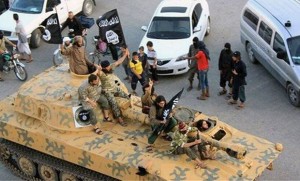
The so-called “hacking division” of ISIS claims that they obtained the data on military personnel by hacking US military data servers. According to the “New York Times” newspaper the Pentagon and Washington confirmed that an investigation into the site is being carried out.
A few days earlier, the EU counter-terrorism coordinators warned that “Al-Qaeda” and the “Islamic State” were planning terrorist attacks in Europe according to available data.
The fact that ISIS militants are expanding the zone of their operations is eliciting the utmost concern. They are already present in not only Syria, Iraq but in Afghanistan, Yemen, other Arab and African countries and their operations are characterized by extreme brutality that have claimed masses of victims. (Even in the mountains of Bosnia and Herzegovina black flags of the Islamic State have started appearing).
In Tunisia (in the Bardo museum), 20 people died as a result of the attacks on tourists and in Yemen more than 150 people perished during the terrorist bombings in mosques during Friday prayer.
What is especially alarming in these events is the fact that these barbaric acts are sometimes met with marginal approval from the Arab population, especially when the acts are directed at Western citizens: for example, leaflets and graffiti are appearing in support of ISIS.
According to Western agencies, groups of recruits from different European and Arab countries continually join the ranks of ISIS. Just recently 7,000 people from Tunisia and 2,000 from Jordan joined the ranks of their militants. The Uzbekistan special services believe that 5,000 members of the “Islamic Movement of Uzbekistan” have sided with ISIS. According to the independent NGO “International Crisis Group” the people amongst them are from different social strata: very young hairdressers, successful businessmen, migrant workers without work, students, not only expelled for poor academic performance but altogether promising.
It seems obvious that the rise in activity of Islamic extremist groups should cause alarm in the governing bodies of European Union countries whose citizens are in the sights of ISIS militants. But it is rather as if many Western leaders don’t see, nor understand the dangers and tragedy of this situation and incessantly repeat that the main threat to Europe is not ISIS at all but Russia, as stated by the Minister of Defense of Great Britain.
A number of American politicians, waving away the dangers of Islamic radicalism, puts Iran on the forefront considering it “a major threat to Iraq, the whole of the Middle East and American interests” as a high-ranking American military said in an interview to The Washington Post newspaper on 21 March of this year for example. The former director of the CIA, former commander of the US Central Command and former commander of US forces in Iraq expressed the same sentiments. “The current Iranian regime is not our ally in the Middle East. It is ultimately part of the problem, not the solution, he said. The more Iran achieves regional hegemony the more it inflames Sunni radicalism, nourishing such organizations as the Islamic State. Although we have common interests in regards to ISIS, globally our interests diverge… Tehran is deeply hostile to us and our friends. The more tangible Iranian domination becomes, the more it sets off reactions that are also harmful to our interests and to Sunni radicalism.”
ISIS keeps the whole world in suspense with its military conquests and inhuman cruelty. At the same time the success of ISIS is largely explained by sophisticated media-strategies. It is founded in the use of political Internet propaganda, spread through online resources, professionally edited video demonstrations, photographic demonstrations from scenes of military operations, publications of messages in different languages on social network sites, blogs, etc.
According to Senior Professor of the Department of World Political Processes MGIMO (University) Elena Zinovyeva, news and announcements of ISIS are diffused through social networks, Twitter and Facebook. Videos are transmitted via Youtube. Furthermore, online services such as Sound Cloud, JustPaste.it, Ask.fm are used. The impact that these communications have on the wider Arab audience, characterized by a high religiousness but with a low level of education and political consciousness, is enormous. Admonishments and appeals of ISIS are listened to by the believing masses, surprisingly a lot of women and entire families: The Islamic state is perceived as a force, preaching and practicing “true Islam” and many young Muslims, feeling doomed and restless in their own society, are ready to join fighters for Faith. They do not stop even with reports of huge casualties among Muslims.
Nevertheless a growing understanding of this obvious truth is growing in Middle East states on how to cope with terrorism, with Islamic extremism (this major threat to international peace and safety), and that it is only possible by the collective efforts and combined actions of all main international players, including Russia and Iran. Some signs of “enlightenment” have appeared recently: for example, the US Secretary of State John Kerry said that it is necessary to maintain contact with the government of Bashar al-Assad. However, to reverse the situation and to really put a decisive barrier in the way of obscurantism, the barbarity of the Islamic State and terrorism in general, the leaders of Western countries need to introduce radical adjustments to their valuation of a real situation and accordingly, to its specific practical political actions.
Vladimir Mashin, Ph.D. in History, a political commentator, exclusively for the online magazine “New Eastern Outlook”.